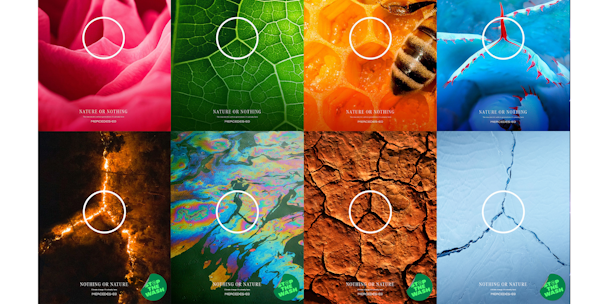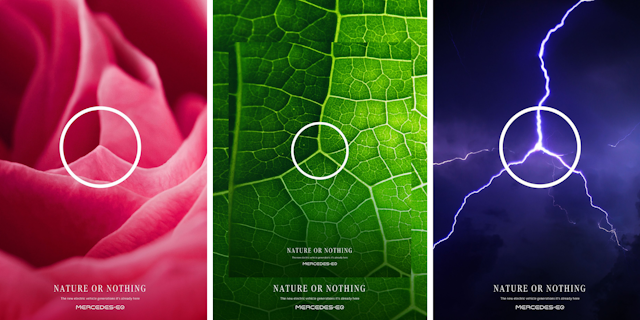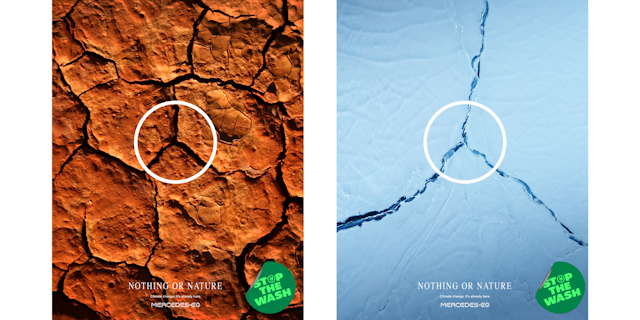
Advertisement

Mercedes says it is clarifying the source of the English motifs and claim/ Image via WhereFrom
Mercedes-Benz has claimed a campaign to promote its electric car range was not approved to run globally after it was pilloried and parodied by sustainability platform WhereFrom, which has accused the company of greenwashing.
The campaign at the heart of the confusion (and controversy) was created by Leo Burnett Mexico. It consists of a series of posters featuring the Mercedes logo over close-up natural images and the slogan ’Nature or Nothing’.
It quickly gained attention across social media and drew criticism for the claims of sustainability when Mercedes’s owner Daimler is currently facing legal action from climate groups in Germany over its environmental impact.

Amid this backlash, sustainability-focused consumer review platform WhereFrom, in collaboration with the creative agency 10 Days, hijacked the campaign and replaced the original images with ones of fire, drought and famine. The copy was updated to read ’Climate change. It’s already here.’

However, the automaker is now distancing itself from its own work, claiming it was a local campaign from Mercedes-Benz Mexico that was never intended for global rollout and that the automaker did not approve the English translation.
An official spokesperson for Mercedes told The Drum: “This is not a global brand campaign. It is local social media content by Mercedes-Benz Mexico on the occasion of Earth Day in April 2022 and continued to be posted during the first week of May as follow up.
“The original claim of the Mexican Earth Day communication was Spanish ’Nuestro futuro siempre ha estado aquí’ (EN: ’Our future has always been here’). We did not create nor approve the English claim ’nature or nothing’. Mercedes-Benz did not approve any change of this claim and is not the distributor of the English motifs. None of these adapted contents have been published on any official Mercedes-Benz social media channels.”
Mercedes added that it is currently clarifying the situation and the source of the English motifs and claim.
10 Days co-founder Jolyon White told The Drum that its team originally saw the posters circulating on LinkedIn, where users were ”celebrating how brilliant the campaign was”. He said his team researched its origins and discovered ”the campaign was on social media and also celebrated on the website of creative agency Leo Burnett”.
“Regardless of what end line they use, this is still 100% greenwashing,” he said.
“The reference to the word ’nature’ is only part of the problem. To say the future is already here is a massive over-claim when equating these images of simply beautiful nature, positioning Mercedes as clean and natural, which is just inherently untrue.“
Meanwhile, 10 Days co-founder George White decried Mercedes’s lack of accountability as disappointing. “You can place communications anywhere and they still can be shared globally. Hence the phrase ’going viral’ – just because it positions campaigns as local and global doesn’t mean they won’t reach further. Mercedes [is a] sophisticated marketer – [one] of the top spending advertisers in the world. It knows this.
“It is disappointing that Mercedes is trying to distance itself from a campaign it has created. This PR spin to avoid accountability is exactly the reason we are struggling with climate change in the first place and Mercedes, sadly, has a track record of this.
“Creative agencies are in a position to guide and challenge their clients to communicate authentically, rather than become partners in crime by greenwashing.”
WhereFrom co-founder Adam Williams says he truly believes that Mercedes are trying to mitigrate greenwashing, “without harming profits too much of course - but the audacity to leverage your marketing campaigns as weapons to convince the public that you’ve somehow come full circle? No, Mercedes!”
His message? “Stop the greenwashing. Just simply tell us about how you’re going about making positive change. Take responsibility for your actions.”
Greenwashing continues to be a significant problem in the advertising industry. A recent European Commission report revealed 42% of companies’ green claims are exaggerated, false or deceptive. Furthermore, according to the UK advertising watchdog, in the past 12 months 16 advertising campaigns from household brands in the UK exaggerated their green credentials and were unable to substantiate them.